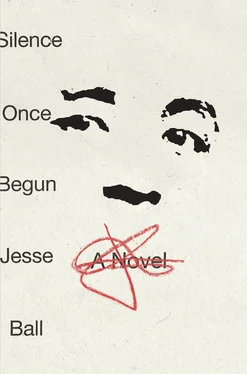And so, as with many lessons, we learn them and forget them and then are forced to learn them again. The time had come for me to regain my composure as a Hollarite, as a fellow who finds things by seeing what is there.
So, after two months of fruitless search, I stopped searching. I would spend my time looking through the transcripts of Oda Sotatsu’s interrogations. I would correspond with his brother, Jiro. I would collect materials and take notes. I would prepare the parts of this very book as best I could.
Also, and perhaps most important, I would wander the area where Jito Joo had last been seen, and I would look at each thing I saw. I would ask myself, what is this that I see.
And so it came to pass after a month of sifting and thinking, I came out of a shop on a street — a street I will tell you where I had often walked! — and there she was. I recognized her from the photographs I had seen. She was on the sidewalk; it was the middle of the afternoon. She was holding a shabby cloth bag and looking at a scrap of paper. That there, I thought, is the addition of twenty years of life to the woman Sotatsu knew, the woman I had seen in photographs. It is what she must look like — it is just what she would look like. Never having seen this older Joo before, I could not look for her, but being prepared to learn what things were by looking at them — suddenly, I found her.
— Joo, I said. Jito Joo?
I explained myself poorly. She was somewhat hostile, at the very least confused and distrustful. However, she also appeared to be a person to whom others seldom spoke. After a little while, I won her trust sufficiently that we went back to her house to speak. In a phrase, she looked quite down on her luck. To whom have you been speaking , she kept asking. To whom?
[ Int. note . This portion is retold from memory, as I did not tape the interaction. You will notice the style of the text differs slightly. That is the reason.]

We passed through several neighborhoods, each poorer than the one before, until we came to an extremely humble street. This one, said Joo, and led me up the steps of a converted building. Her flat was on the top floor, at the back of the house, and looked out onto a small untended patch of ground, and beyond it, a series of other ramshackle buildings running down a long slope.
Her apartment was largely empty. It appeared as if she had just moved in. How long had she lived there? Nineteen years in December.
It was strange, let me tell you, standing there in that apartment with a fifty-year-old Japanese woman I had never met, and no sense at all of what might come of any of it. She looked at me and waited.
Joo, I said, I want to ask you some things. I want to talk to you about Oda Sotatsu. I want to talk about Kakuzo. I want to speak about the poem that was written on a photograph of you. I am looking for this mystery. Not the mystery of why it happened but the mystery of how.
I will tell you nothing about it, said Joo. The person who would speak about it is gone now, gone a long time.
But what if I speak to you? I said. What if I speak about it — about this and about other things. What if I show you it would matter for you to speak. That speaking to me would matter.
She said nothing, but I drew a deep breath and continued.
Her apartment had no kitchen — just a sort of hot plate on a little counter with a sink. She put some water in a pot and set it on the hot plate.
You don’t know me at all, I said, but I have a feeling that you know about something that I know.
And with that, I began.
Int. Note: Speaking to Joo in Her Home
I had never really known anyone, I said, until I met her. It was strange because — at that time I could not speak her language, and she spoke mine only poorly and with little understanding. Still we spoke furiously to each other. Every moment was a new chance to share confidences. I found myself trying to tell her every last thing I had ever seen.
This was your wife, asked Joo.
She is still alive, I said, but she isn’t now my wife.
In fact, I said, I have not seen her now in a long time. And when I have, I do not know that person. For years we lived together. I threw everything to the winds and went with her where she would go. She had a child, a daughter, and we raised that child together. I no longer desired the things I had before. To be a writer, to make my way in the world — these were nothing. These meant nothing. I wanted simply to go from place to place with her, to sit anywhere with her and see what she would say, see what she saw, what she liked, see that she was glad. I felt the fullness of this new life — and I saw that what I had thought before was important was not important at all.
I sealed off a small life from the larger world, and we lived there, as glad as any people could be.
You can never have such a thing, said Joo. Not and keep it.
One day, I said, one day it happened that we had changed countries for the third or fourth time. We were living in a large city in the country of my birth and I was teaching to earn our living. It was not what I wanted; still, I did it, so we could live and eat, and so our daughter could go to school.
One day, my wife stopped speaking. She was in the bathroom, staring into a mirror, and she found something. Something was there, of some sort. I don’t know what it was, but she found it, and from then on she no longer wanted to tell me anything. She would speak, to say things, here is the door key, or, shall we go to dinner, but to say an actual thing, to tell me something, anything, the desire for it was gone entirely. We would sit and she would stare into space. I would ask what she was looking at, what she was thinking. Nothing. Nothing in particular, she would say. I loved her beyond all measure. I would do anything I could think of, everything, to cheer her up, to surprise her. I banished all dark, all difficult things, from the house. I searched out all kinds of cheerful laughter and fellowship and offered them to her, one, then another, then another, then another. I found bright places in the city where we lived, and took her there, hoping. But her mood grew only blacker. She took to lying in bed and staring up at the ceiling. My dear, I would say, my dear. She would say nothing.
Our daughter was beginning to turn out into the world. She was of that age. She was seeking new things, things only for herself, and discovering the duplicity of other children. In the summers she would return to her home country, and so we sent her off as usual that June.
My wife was in such a grief, her father was passing, and I thought that was the whole of it, but it was beyond that. She had gone into herself in search of a whole new enterprise and she began intricate new dialogues with imagined speakers. She was a magnificent writer, one of the finest I had ever met, and she lacked for no form of invention. Suddenly, she began to invent a new way of living entirely in her imagination. From this she shut me out completely. She was now speaking solely with the ones she had imagined. And one day it came that she sought their advice: this life she was leading with me, should she escape it?
I was as in love as I had ever been. Constantly at her service, I came up with a dozen new ways each day to try to divert her, to make her smile and forget her grief. But it happened that a day came when I needed to travel to another city. I was to do a reading in San Francisco, and I went there. When I left that day, I felt that there was nothing truly wrong — that our troubles were small and together we would conquer them. I felt that her grief for her father was right. It seemed to me that the girl I loved would find her way through it.
Читать дальше













